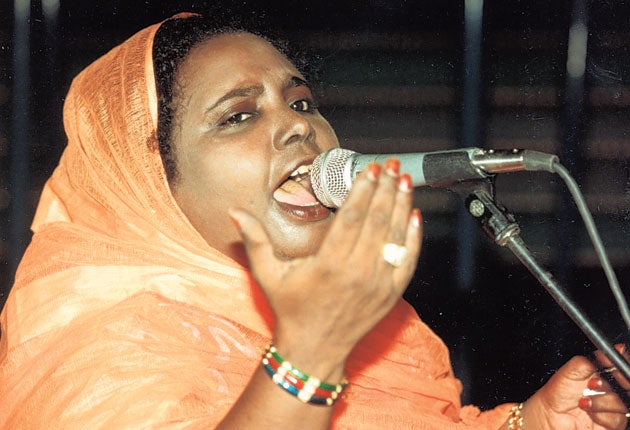Dimi Mint Abba: Musician known as 'la diva du désert' and hailed by Ali Farka Touré as Africa's greatest singer

Dimi Mint Abba, one of the pre-eminent vocalists to emerge from present-day Mauritania, became the de facto international face of modern Mauritanian music. But she was also steeped in the region's bardic and classical traditions, fluent in demotic Hassaniya and classical Arabic, as well as being eloquent at explaining her material in post-colonial French for European audiences. She was hailed as la diva du désert and became the one Mauritanian name that even casual fans of world music could drop comfortably into conversation – or cite reverentially and with respect, as Robert Plant, an ambassador of her music, has done. Mali's defining singer and guitarist, Ali Farka Touré, reputedly called her "Africa's greatest singer".
The most influential Mauritanian musician of the last 50 years, she was born Loula Bint Sidati Ould Abba in 1958 into a well-known family of hereditary caste musicians known in Mauritania as iggawen or iggawin. Theirs is a tradition similar to the griots of sub-Saharan Africa. Yet despite their historical role as nomadic troubadours who brought news, social commentary and cultural biography in song to the courts of Bidan chieftains, moneyed merchants' homes, wedding celebration and festivities, like musicians in many societies across the world, they were deemed low-caste.
Her mother, Eida Mounina Mint sang, while her father, Sidati Ould Abba, was an innovatory and transitional force in Mauritanian music. He had first recorded – a major Mauritanian development – in the year of his daughter's birth. From early childhood, her mother taught her how to sing and accompany on the tabl (kettledrum) and ardin – the Moorish gourd-resonator harp, kin to Africa's better-known kora and associated with female musicians.
She debuted on Mauritanian radio in 1976, having previously appeared in a family setting aged 16. In 1976 she won a gold prize at a Tunisian festival honouring the Egyptian-born, pan-Arab singing star, Umm Kalthum for the metaphorical pen-is-mightier-than-the-sword "Sawt Elfan", or "Sawt al-Fan" (Art's Plume), whose lyrics hold that a society's musicians are more important than its warriors. She represented her nation at festivals in Iraq, Algeria and Morocco.
After her World Circuit release, Moorish Music From Mauritania (1990), her star rose. From appearances in North Africa and, from 1989, Europe, she travelled ever more extensively, touring the United States in 1993 and appearing at WOMADelaide 2009 in Australia. In Britain her powerful, nuanced voice was heard at the Womad festival in 2004 and the BBC Proms in 2006 as part of the UK's Festival of Muslim Cultures.
Her recorded output fell into three main categories. The lion's share was geared towards local consumption, feeding what the writer and musicologist Peter Manuel in a global context described as "cassette culture". Describing one of these local releases, Nouadhibou, in the first volume of The Rough Guide to World Music (2006), Matthew Lavole wrote, "Moorish music does not get any better." Next, there was the French label Auvidis's bridge-building Musique et Chants de Mauritanie (1992), recorded on her third European tour. Last, there was Moorish Music From Mauritania (1990) co-credited to her second husband, Khalifa Ould Eide – more westernised, less classical and distinctly moreish for musical tourists of the armchair or festival kind.
She was admitted to hospital in Rabat in Morocco, following an accident on 27 May. The Mauritanian President Mohamed Ould Abdel Aziz described her death as "a national loss".
Ken Hunt
Loula Bint Sidati Ould Abba (Dimi Mint Abba), singer and ardin player: born Tidjikja (formerly Fort Coppolani), Tagant region, Mauritania 25 December 1958; married firstly Seymali Ould Hamed Vall (one daughter), secondly Khalifa Ould Eide (died 2001; one daughter); died Rabat, Rabat-Salé-Zemmour-Zaer region, Morocco 4 June 2011.
Join our commenting forum
Join thought-provoking conversations, follow other Independent readers and see their replies
Comments